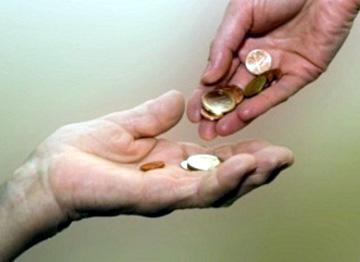This week we read a special parsha for the eighth day of Pesach.
It’s rare for Pesach to fall on Shabbat. During the whole of the 20th century, the Eve of Passover fell on Shabbat only 12 times. In the 21st century, it has occurred four times. So we mark the event with special parshas.
Although there is a discussion of Passover later in the parsha, we begin with the commandment to tithe every year. “You are to eat, before the presence of God…the tithe from your grain, your new wine, your oil and the firstlings of your flock and your herd.”
At the end of seven years, you’re supposed to release your fellow Hebrews from any loans you have made to them. You’re also supposed to free all Hebrew servants, giving them animals and grain, so you don’t send them away empty handed.
“You are not to toughen your heart, you are not to shut your hand to your brother, the needy one. You must remember,” says the parsha, “that the poor are always among you. Therefore, give to the needy. Open your hand. If you do, God will bless you in all your doings.”
Now we get to Passover, in the New-Moon of Aviv. Here’s what you’re supposed to do.
- Kill the Passover offering
- Don’t eat regular bread, only matzah, the bread of affliction
- Don’t have beer, because it’s fermented.
- Don’t keep any food overnight.
And thousands of years later, we still follow these commandments (except for getting our meat from the grocer’s)!
Seven weeks after Passover, you are supposed to observe a pilgrimage festival (Shavuot). That’s a happy holiday. “You are to rejoice before the presence of God, you, your son, your daughter, your servant and your maid, and the orphan and the widow that are among you.”
Then there’s Sukkot, also a happy holiday.
Notice we’re not yet ordered to go to Jerusalem. That comes later, in Deuteronomy.
Food for Thought
Why do you think only Hebrews get the benefit of forgiveness of loans and freedom from service after seven years?

